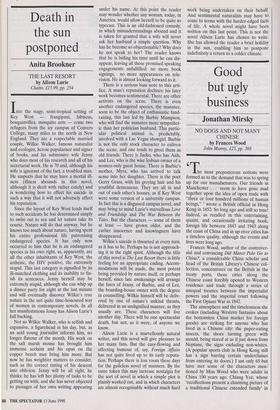Death in the sun postponed
Anita Brookner
THE LAST RESORT by Alison Lurie Chatto, £15.99, pp. 254 Into the stagy, semi-tropical setting of Key West — frangipani, hibiscus, bougainvillea, mosquito nets — come two refugees from the icy campus of Conyers College, many miles to the north in New England. They are a respectable married couple, Wilkie Walker, famous naturalist and ecologist, heroic populariser and signer of books, and his submissive wife Jenny who does most of his research and all of his secretarial work. He is 70 and, although his wife is ignorant of the fact, a troubled man. He suspects that he may have a mortal ill- ness (illness abounds in this novel, although it is dealt with rather cutely) and is wondering how to effect his suicide in such a way that it will not adversely affect his reputation.
Since the layout of Key West lends itself to such accidents he has determined simply to swim out to sea and let nature take its course. Nature will do that anyway, but he knows too much about nature, having spent his entire professional life patronising endangered species. It has only now occurred to him that he is an endangered species in his own right, as, apparently, are all the other inhabitants of Key West, the arthritic, the HIV positive, the extremely stupid. This last category is signalled by its ill-matched clothing and its inability to fin- ish its sentences. Jenny herself may be extremely stupid, although she can whip up a dinner party for eight at the last minute and will eventually discover Wilkie's true nature in the not quite time-honoured way of women in contemporary novels. In all her manifestations Jenny has Alison Lurie's full backing.
Not so Wilkie Walker, who is selfish and expansive, a figurehead in his day, but, as an acid young journalist informS him, no longer flavour of the month. His work on the salt marsh mouse has brought him immense acclaim and his opus on the copper beech may bring him more. But now he has weightier matters to consider, such as the correct timing of his descent into oblivion. Jenny will be all right, he thinks: he has left her plenty of tasks to be getting on with, and she has never objected to passages of her own writing appearing under his name. At this point the reader may wonder whether any woman, today, in America, would allow herself to be quite so typecast. This is an old-fashioned comedy, in which misunderstandings abound and it is taken for granted that a wife will never ask her husband a simple question. Why has he become so objectionable? Why does he not speak to her? The reader knows that he is biding his time until he can dis- appear, leaving all those promised speaking engagements unfulfilled: no more book signings, no more appearances on tele- vision. He is almost looking forward to it.
There is a serious bass note to this arti- fice. A man's reputation declines; his later work becomes sentimental. There are other activists on the scene. There is even another endangered species, the manatee, soon to be the object of enthusiastic fund- raising, this last led by Barbie Mumpson, who will find the manatee more sympathet- ic than her politician husband. This partic- ular political animal is, predictably, involved with a Las Vegas showgirl. Barbie is not the only stock character to enliven the scene, and one tends to greet them as old friends. There is Jacko, who has Aids, and Lee, who is the wise lesbian owner of a women-only guest house. There is Barbie's mother, Myra, who has arrived to talk sense into her daughter. There is the poet Gerry Grass, with his greying hair and his youthful demeanour. They are all in and out of each other's houses, as if Key West were some version of a university campus. In fact this is a disguised campus novel, and may bring to mind Lurie's marvellous Love and Friendship and The War Between the Tates. But the characters — some of them at least — have grown older, and the earlier innocence and knowingness have disappeared.
Wilkie's suicide is thwarted at every turn, as it has to be. Perhaps he is not approach- ing it in the right spirit. Although the title of this novel is The Last Resort there is little feeling for an appropriate ending. Accom- modations will be made, the most potent being provided by nature itself, or perhaps herself, since late awakenings will arrange the fates of Jenny, of Barbie, and of Lee, the boarding-house owner with the degree in counselling. Wilkie himself will be deliv- ered by one of nature's unkind thrusts, delivered in an undignified manner, as they usually are. These characters will live another day. There will be one spectacular death, but not, as it were, of anyone we know.
Alison Lurie is a marvellously natural writer, and this novel will give pleasure to her many fans. But the easy-flowing and affecting humour of, say, Foreign Affairs has not quite lived up to its early reputa- tion. Perhaps there is less room these days for the guileless novel of manners. By the same token this may increase nostalgia for the sort of novel in which a simple plot is plainly worked out, and in which characters are almost recognisable without much hard work being undertaken on their behalf. And sentimental naturalists may have to come to terms with the harder-edged facts of life. A whole novel might have been written on this last point. This is not the novel Alison Lurie has chosen to write. She has allowed the reader a brief holiday in the sun, enabling him to postpone indefinitely a return to a colder climate.


































































 Previous page
Previous page